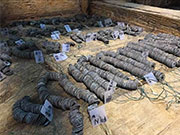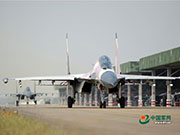

China's auto industry saw its biggest sales increase in 10 months in October, partly due to government incentives and a rebound in demand, an industry body said on Wednesday.
With more than 1.9 million passenger cars sold in October, sales rose 13.34 percent from a year earlier and by 10.6 percent from September, according to data released Wednesday by the China Association of Automobile Manufacturers (CAAM).
October's sharp sales growth represents a significant recovery following a three-month decline over the summer, the CAAM said.
The Chinese auto market experienced a sales slump for three consecutive months in June, July and August, with sales falling 3.4 percent, 6.6 percent and 3.4 percent year-on-year, respectively, according to the CAAM's data.
Sales growth only returned in September, with a rise of 2.1 percent.
Dong Yang, executive vice president of the CAAM, said the growth in October was partly due to a tax cut by the central government for smaller cars.
"The government incentive program has been effective," Dong said at a press conference in Beijing on Wednesday, noting that the tax cut has stimulated demand.
The purchase tax was cut by half to 5 percent for cars with engines smaller than 1.6 liters, in an effort to boost sales of smaller cars, which account for more than 60 percent of China's car market, the Wall Street Journal reported in September.
In addition, the Ministry of Finance said in April that buyers would be offered subsidies worth between 31,500 yuan ($4,948.65) and 54,000 yuan per car for purchases of new-energy vehicles (NEVs).
Local governments have also introduced incentives for people to buy NEVs.
For example, Beijing has eased restrictions on license plates for NEVs, and on October 25 the city announced that all NEV buyers could bypass the normal lottery system for obtaining a license plate, according to media reports.
The CAAM said that as a result of such incentives, sales of NEVs surged in October, with more than 34,000 sold, up 500 percent year-on-year.
Dong said that government incentives were not the only reason for the rise in demand in the market.
The improved sales performance in October might also have resulted from an "improving" economic climate and the fact that the car ownership ratio in the country remains relatively low, Dong said.
Zhang Yu, managing director of Shanghai-based Automotive Foresight Co, agreed that there had been a rebound in demand, which he said was partly due to a recovery in the Chinese stock market after turmoil over the summer.
"I think people are more comfortable now to go out and buy cars," Zhang told the Global Times on Wednesday, noting that the stock market crash in June had affected people's confidence about making purchases.
In addition, sales promotions also boosted sales in October, according to Wu Shuocheng, an independent industry analyst in Shanghai. He told the Global Times on Wednesday that there will be more sales promotions in the coming months, as car companies try to reach their end-of-year targets.
However, even though car sales will continue to grow in China, the growth rate might not be the same as was seen in October as it's uncertain whether demand has fully recovered, experts said.
Amid the slower growth in China's auto market and the rise in competition, the government may well take further measures to boost demand, according to a report released Wednesday by Fitch Ratings.
There might be mergers among auto companies, the report said, citing a government document published in 2009, and there could be other moves that might change the structure of the Chinese auto industry.
The document, which set a goal of less than 10 companies having market share of 90 percent, showed that the government supports consolidation in the auto industry, even though this will not be easy, according to the report.
 |
Day|Week

 What is inside China's icebreaker ‘Xuelong’?
What is inside China's icebreaker ‘Xuelong’? Chinese, U.S. navies hold first-ever joint exercise in the Atlantic
Chinese, U.S. navies hold first-ever joint exercise in the Atlantic Beautiful graduate from police college becomes Internet hit
Beautiful graduate from police college becomes Internet hit In pics: skies of glory
In pics: skies of glory 10 tons of copper coins unearthed in 2,000 years old ancient tomb
10 tons of copper coins unearthed in 2,000 years old ancient tomb J-10, J-11, Sukhoi Su-30 fighters vs. HQ-9 anti-aircraft missile system
J-10, J-11, Sukhoi Su-30 fighters vs. HQ-9 anti-aircraft missile system Russian plane crash victims sucked out of seats as 'external impact' blew jet apart
Russian plane crash victims sucked out of seats as 'external impact' blew jet apart World's most heart-pounding bridges
World's most heart-pounding bridges First Glass Suspension Bridge in China Opens to Visitors
First Glass Suspension Bridge in China Opens to Visitors The world famous machine guns
The world famous machine guns
